Scroll through the lesson and click on notation/video/audio links to load the interactive players.
Please subscribe to get full access to all lessons for only $7.95/month PLUS 1 week free trial.

Riff Interactive lessons are
LESS expensive and
MORE interactive than alternatives!
More Info
|
|

In The Style oF B.B. King -
part 1
BB KING LESSON SAMPLE
Lyle:
B.B. King is the King of the Blues without a doubt. The thrill is never gone
when I listen to him. Listen to the Lesson Sample. You'll be learning how to
play all the riffs in the sample.
Lyle: The B.B. King style is made up from
blues riffs that include bends and quick vibratos. You might be good at bending
notes, but you'll need to be aware of half step bends and whole step bends here
in the riffs that follow. Half step means 1 fret, whole step means 2
frets. Practice bends anywhere on the neck and
try it with different fingers. You don't need to use your pinky finger though;
it's rarely used for bending. Play a "target" note, which is used to get a
reference, and then bend up to it like in this video example of a half step
bend. You can bend the string by pushing or pulling. Sometimes you'll need to
use your index finger for the half step bends. Practice half step bends on
different fingers, not the pinky.
half step bend ex1
Lyle:
Most of the time you'll be using your 3rd finger to bend with. I suggest
grabbing the string with your second finger also, to help push or pull the
string. Look at these two examples of whole step bends then try to do them. Practice this type of bend
everywhere on the neck.
whole step bend
ex1
whole step bend ex2
Lyle:
In the basic minor pentatonic pattern, there are certain notes that get bent a
lot when playing blues licks. Here they
are:
bend locations
for the pentatonic
Lyle:
Vibrato is the other key element in the B.B. King style or any blues riffs for
that matter. Vibrato is the act of wiggling the string.
Here's a look at the most common method for adding vibrato to a note and what it
looks like in the Riff TAB. You'll wiggle the note up and down slightly as if
you were applying quick little bends. The video will help show this
technique.
vibrato ex
1
Lyle:
The other method is what I call the "violinist's vibrato" because it's a method
used on the violin since you can't bend or wiggle the string. This technique is
very useful when you need to add vibrato on the 1st string since there is no
room to wiggle the string without it falling off the fret
board.
vibrato ex
2
Lyle:
Ex. 3 can give you a good idea how to practice the vibrato. It's just the B
minor pentatonic scale with vibrato on every note. Make sure you have a strong
grip on the note. This helps for sustain also.
vibrato ex
3
Lyle:
Take any scale you know along with this one and add vibrato to each note for a
great workout.

Lyle: Now you're ready to learn some riffs
using bends and vibrato. This lesson is in the key of B minor. Your best scale
of choice for B.B. style riffs is the B minor pentatonic because of the
simplistic nature of the scale.
Lyle: You should know this pattern; it's the
most common pattern for the minor pentatonic. You used it just a few minutes ago
to practice vibratos with too.
Lyle:
Here's another pattern you should know. Use your 2nd or 3rd finger and slide up
to the 11th fret on the G string. The root notes (B) are
highlighted.
Lyle:
Look at the two patterns together on the virtual neck. These patterns are where
you'll be playing most of the riffs.
Lyle:
Here are 3 basic riffs in the B.B. King style using sections from the B minor
pentatonic scale.
riff 1
Lyle:
Notice the whole step and half step bends in this riff:
riff 2
Lyle:
Important: bending and vibrato is one of the key elements in blues licks and the
B.B. King style, so pay attention to the sound of the lick and the notation to
help you.
riff 3
Lyle:
You can see that all these licks come from the B minor pentatonic patterns we
went over.
Lyle: Here's a solo that combines the 3 riffs
from above plus a few more.
solo 1
Lyle:
Notice in this last tab, you leave spaces. You don't have to play a lick all the
time and you don't have to play fast. Besides serious vibrato and cool bends, BB
King has a great sense of timing for each of his licks. I think BB said he plays
like he is singing the notes.
Lyle: Here's a jam track you can use to
practice these riffs with:
Looping Sound Clip 1
Lyle:
I'd like to show you how I use some of these riffs in the real world. This is an
audio sample of me playing a solo on the album called "The Gift of Christmas" by
En Vogue. This is a 12 bar blues using the same exact chord progression and key
that this lesson is in but the beat is different. The solo starts and ends with
a few B.B. King style riffs. Listen and see if you can recognize
them.
En Vogue
solo sample
solo 1

Lyle: B.B. King doesn't play chords much, if
at all, but I thought you might like to learn the chords that go along with the
jam track.
Lyle: The 12 bar blues is a simple chord
progression used in blues, most of the time using the 1, 4, and 5 chords of the
key. In the jam track there are 4 chords Bm7, Em7, Gmaj7, and F#7alt. The (alt)
means altered dominant chord. This could mean several note choices to alter such
as the 5th (b5 or #5) degree and the 9th (b9 or #9) degree. In this case I'll be
showing you how to play F#7(#9/#5) chord. That's a mouthful! Don't worry if you
don't understand, just learn the chord and memorize the
names.
Lyle: Here's all 4 chords in positions I
suggest using for this lesson:
Bm7
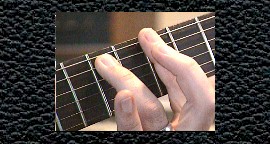
Em7
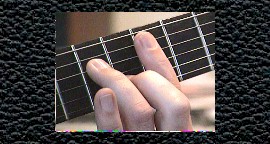
Gmaj7
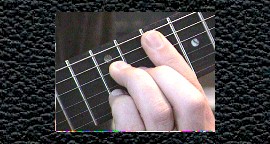
F#7alt
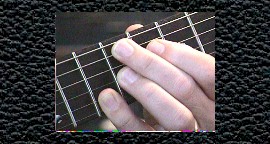
Lyle:
Here's the chord chart that shows you when to play the chords for the jam
track:
chord
chart
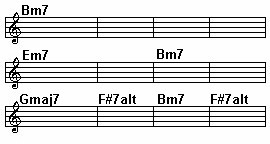
Lyle: Try strumming once on beat 1 of every
measure like in this TAB example:
chord
exercise
Lyle:
That's all for this lesson.
If you would like further study on this topic or any other topic, email me at
Lyle@theguitar.net for info on how you can get your own customized guitar
lessons like this using Riff Interactive technology. Your private lessons can be
downloaded to your pc for anytime, anywhere study. Thanks and see you at the
next lesson. - Lyle
|
<< load notation from left
|
|
<< load audio from left
|
<< load audio from left
|